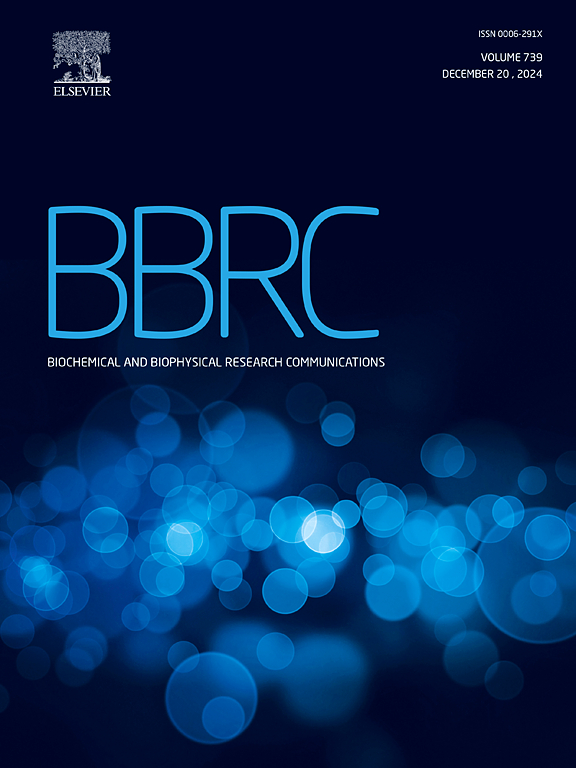PEG-modification enhances the targeted photothermal therapy of affibody-conjugated indocyanine green for precision cancer treatment
IF 2.5
3区 生物学
Q3 BIOCHEMISTRY & MOLECULAR BIOLOGY
Biochemical and biophysical research communications
Pub Date : 2025-01-01
DOI:10.1016/j.bbrc.2024.151155
引用次数: 0
Abstract
Photothermal therapy (PTT) is an innovative cancer treatment that leverages heat generated from near-infrared light exposure to induce tumor cell death. A major challenge in PTT is achieving precise delivery of the photothermal agent to tumor tissues to maximize efficacy and minimize off-target effects. In this study, we introduce a novel ligand-coupled photothermal reagent that addresses this challenge by leveraging the high-affinity HER2 affibody ZHER2:2891 (referred to as ZHER2), conjugated with indocyanine green (ICG) for targeted delivery. Polyethylene glycol (PEG) was incorporated as a hydrophilic linker to further optimize photothermal conversion efficiency and enhance tumor-specific targeting. Among the conjugates tested, ZHER2-PEG1000-ICG, modified with a PEG chain of 1000 Da molecular weight, demonstrated exceptional performance. In vitro studies revealed that ZHER2-PEG1000-ICG specifically bound to HER2-expressing cells and effectively induced cell death. In vivo experiments using HER2-positive N87 tumor-bearing mice showed that ZHER2-PEG1000-ICG accumulated highly and specifically in tumor tissues over an extended period. Upon light irradiation, this conjugate caused a significant rise in temperature at the tumor site, resulting in complete tumor elimination with a single photothermal treatment. This PEG-modified affibody-ICG conjugate represents a precise and effective approach to PTT, offering a promising new therapeutic strategy for cancer treatment with the potential to significantly impact future cancer therapies.
peg修饰增强了修饰物偶联吲哚菁绿的靶向光热治疗,用于癌症的精准治疗。
光热疗法(PTT)是一种创新的癌症治疗方法,利用近红外光照射产生的热量诱导肿瘤细胞死亡。PTT的一个主要挑战是实现光热剂对肿瘤组织的精确递送,以最大限度地提高疗效并减少脱靶效应。在这项研究中,我们引入了一种新的配体偶联光热试剂,通过利用高亲和力的HER2粘附体ZHER2:2891(简称ZHER2),结合吲哚菁绿(ICG)进行靶向递送,解决了这一挑战。聚乙二醇(PEG)作为亲水性连接物,进一步优化光热转化效率,增强肿瘤特异性靶向。在测试的共轭物中,用分子量为1000 Da的PEG链修饰的zh2 - peg1000 - icg表现出优异的性能。体外研究表明,ZHER2-PEG1000-ICG可特异性结合表达her2的细胞并有效诱导细胞死亡。her2阳性N87荷瘤小鼠的体内实验表明,her2 - peg1000 - icg在肿瘤组织中长时间高特异性积累。在光照射下,这种共轭物引起肿瘤部位的温度显著升高,从而通过一次光热处理完全消除肿瘤。这种peg修饰的修饰物- icg偶联物代表了一种精确有效的PTT方法,为癌症治疗提供了一种有希望的新治疗策略,有可能对未来的癌症治疗产生重大影响。
本文章由计算机程序翻译,如有差异,请以英文原文为准。
求助全文
约1分钟内获得全文
求助全文
来源期刊
CiteScore
6.10
自引率
0.00%
发文量
1400
审稿时长
14 days
期刊介绍:
Biochemical and Biophysical Research Communications is the premier international journal devoted to the very rapid dissemination of timely and significant experimental results in diverse fields of biological research. The development of the "Breakthroughs and Views" section brings the minireview format to the journal, and issues often contain collections of special interest manuscripts. BBRC is published weekly (52 issues/year).Research Areas now include: Biochemistry; biophysics; cell biology; developmental biology; immunology
; molecular biology; neurobiology; plant biology and proteomics
文献相关原料
公司名称
产品信息
希恩思
triisopropylsilane
希恩思
trifluoroacetic acid (TFA)
希恩思
N-hydroxysuccinimide (NHS)
希恩思
ICG
索莱宝
isopropyl-β-d-1-thiogalactopyranoside (IPTG)
索莱宝
Isopropyl-β-d-1-thiogalactopyranoside (IPTG)

 求助内容:
求助内容: 应助结果提醒方式:
应助结果提醒方式:


